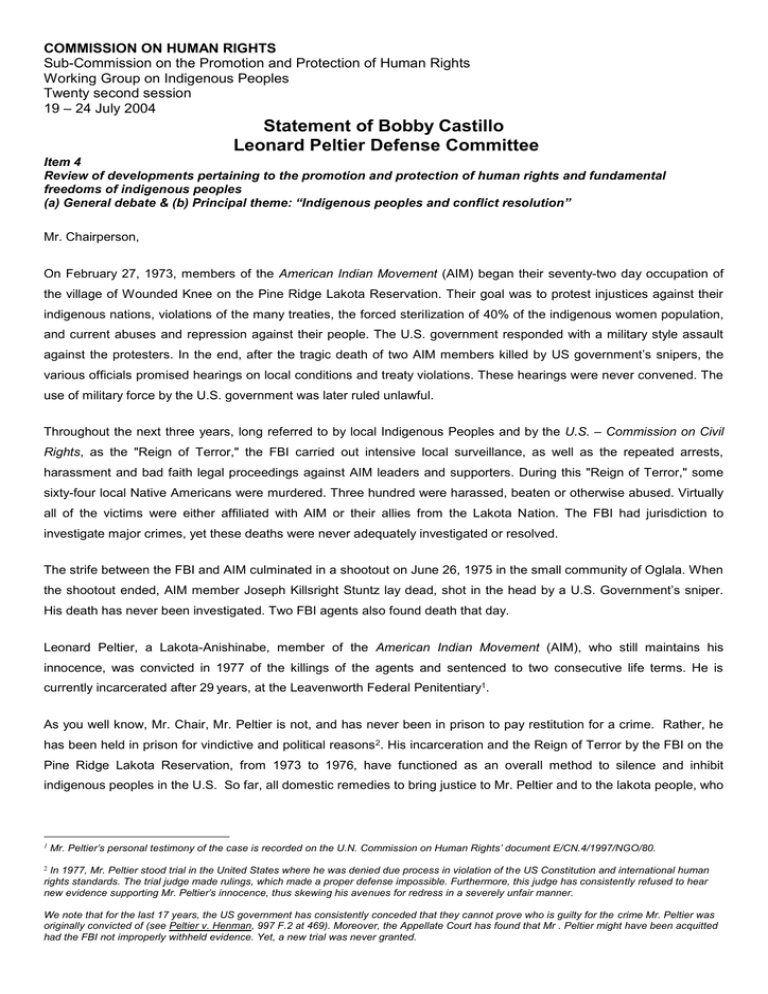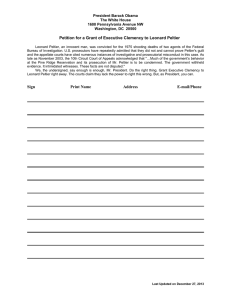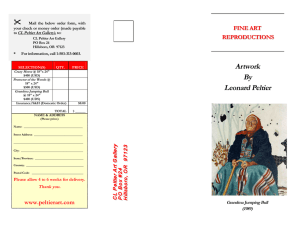COMMISSION ON HUMAN RIGHTS Working Group on Indigenous Peoples Twenty second session
advertisement

COMMISSION ON HUMAN RIGHTS Sub-Commission on the Promotion and Protection of Human Rights Working Group on Indigenous Peoples Twenty second session 19 – 24 July 2004 Statement of Bobby Castillo Leonard Peltier Defense Committee Item 4 Review of developments pertaining to the promotion and protection of human rights and fundamental freedoms of indigenous peoples (a) General debate & (b) Principal theme: “Indigenous peoples and conflict resolution” Mr. Chairperson, On February 27, 1973, members of the American Indian Movement (AIM) began their seventy-two day occupation of the village of Wounded Knee on the Pine Ridge Lakota Reservation. Their goal was to protest injustices against their indigenous nations, violations of the many treaties, the forced sterilization of 40% of the indigenous women population, and current abuses and repression against their people. The U.S. government responded with a military style assault against the protesters. In the end, after the tragic death of two AIM members killed by US government’s snipers, the various officials promised hearings on local conditions and treaty violations. These hearings were never convened. The use of military force by the U.S. government was later ruled unlawful. Throughout the next three years, long referred to by local Indigenous Peoples and by the U.S. – Commission on Civil Rights, as the "Reign of Terror," the FBI carried out intensive local surveillance, as well as the repeated arrests, harassment and bad faith legal proceedings against AIM leaders and supporters. During this "Reign of Terror," some sixty-four local Native Americans were murdered. Three hundred were harassed, beaten or otherwise abused. Virtually all of the victims were either affiliated with AIM or their allies from the Lakota Nation. The FBI had jurisdiction to investigate major crimes, yet these deaths were never adequately investigated or resolved. The strife between the FBI and AIM culminated in a shootout on June 26, 1975 in the small community of Oglala. When the shootout ended, AIM member Joseph Killsright Stuntz lay dead, shot in the head by a U.S. Government’s sniper. His death has never been investigated. Two FBI agents also found death that day. Leonard Peltier, a Lakota-Anishinabe, member of the American Indian Movement (AIM), who still maintains his innocence, was convicted in 1977 of the killings of the agents and sentenced to two consecutive life terms. He is currently incarcerated after 29 years, at the Leavenworth Federal Penitentiary1. As you well know, Mr. Chair, Mr. Peltier is not, and has never been in prison to pay restitution for a crime. Rather, he has been held in prison for vindictive and political reasons 2. His incarceration and the Reign of Terror by the FBI on the Pine Ridge Lakota Reservation, from 1973 to 1976, have functioned as an overall method to silence and inhibit indigenous peoples in the U.S. So far, all domestic remedies to bring justice to Mr. Peltier and to the lakota people, who 1 Mr. Peltier’s personal testimony of the case is recorded on the U.N. Commission on Human Rights’ document E/CN.4/1997/NGO/80. 2 In 1977, Mr. Peltier stood trial in the United States where he was denied due process in violation of the US Constitution and international human rights standards. The trial judge made rulings, which made a proper defense impossible. Furthermore, this judge has consistently refused to hear new evidence supporting Mr. Peltier’s innocence, thus skewing his avenues for redress in a severely unfair manner. We note that for the last 17 years, the US government has consistently conceded that they cannot prove who is guilty for the crime Mr. Peltier was originally convicted of (see Peltier v. Henman, 997 F.2 at 469). Moreover, the Appellate Court has found that Mr . Peltier might have been acquitted had the FBI not improperly withheld evidence. Yet, a new trial was never granted. have been victims of the Reign of Terror in the 1970s, have been obstructed by U.S. prosecutors and the Federal Bureau of Investigation (FBI). After 29 years, the U.S. Courts still won’t correct the wrongs of the past. In November 2003, the U.S. 10th Circuit Court of Appeals acknowledged that: “Much of the government’s behavior at the Pine Ridge Reservation and its prosecution of Mr. Peltier is to be condemned. The government whithheld evidence. It intimiminated witnesses. These facts are not disputed.” Yet, the court claimed it lacked power to address this issue. Therefore, last March, our organization submitted a formal request to the U.S. Congress for an investigation into the Justice Department's actions against Peltier and the American Indian Movement (AIM) during the 1970s. Despite repeated calls for congressional hearings by the U.S. Civil Rights Commission, several Human Rights and Indigenous NGOs , the European Parliament, Nobel Peace laureate and UNESCO Goodwill Ambassador for a Culture of Peace, Mrs Rigoberta Menchu Tum and individual members of Congress, no congressional committee has yet had the courage to investigate the FBI’s role in the politically motivated violence on the Pine Ridge Indian reservation in South Dakota from 1973 to 1976, and the now documented official misconduct against members of AIM during that period or the misconduct in the Peltier case. Mr. Chairperson, The Leonard Peltier Defense Committee would like to thank Mr. Stavenhagen, the Special Rapporteur on the Violation of the Human Rights and Fundamental Freedoms of Indigenous Peoples for raising the issue of Mr. Peltier in his last report to the U.N. Commission on Human Rights (E/CN.4/2004/80) and we fully support the statements he made in the paragraphs 52 and 53 of his report. All over the world the Peltier case is seen as an example of how the justice system deals with indigenous peoples – we have been subjected to an unjust justice. We are at the end of the U.N. International Decade of Indigenous Peoples and we should all together be able to heal the transgressions of the past and to find a way to put an end to the injustices historically perpetrated on Indigenous peoples. Past errors by the U.S. Government against Indigenous Peoples are difficult to redress and much suffering has occurred. Our brother Leonard Peltier continues to be incarcerated and remains a symbol for all of us who are fighting for the respect of our indigenous rights. Truth, justice and reconciliation are needed between Indigenous Peoples and Nation States around the world. Freedom for Leonard Peltier, considered as the « Indigenous Peoples’ Nelson Mandela » and an investigation on the « Reign of Terror » on the Pine Ridge Reservation would be important steps in this direction. The U.S. Government has called for human rights investigations into other countries but ignored its own human rights violations. For years the United States has advocated for the respect of human rights elsewhere, and can now demonstrate its full commitment by speedily resolving a glaring instance of internal injustice. Thank you, Mr. Chairperson. Submitted by Bobby Castillo (Apache/Xicano Nations, International Spokesperson for the Leonard Peltier Defense Committee) LPDC - International Office, PO Box 583, Lawrence, KS 66044, USA Tel 785-842-5774, Fax 785-842-5796, info@leonardpeltier.org



